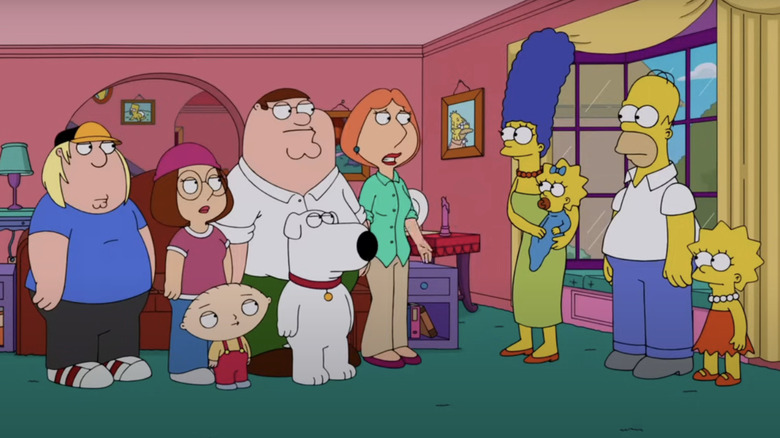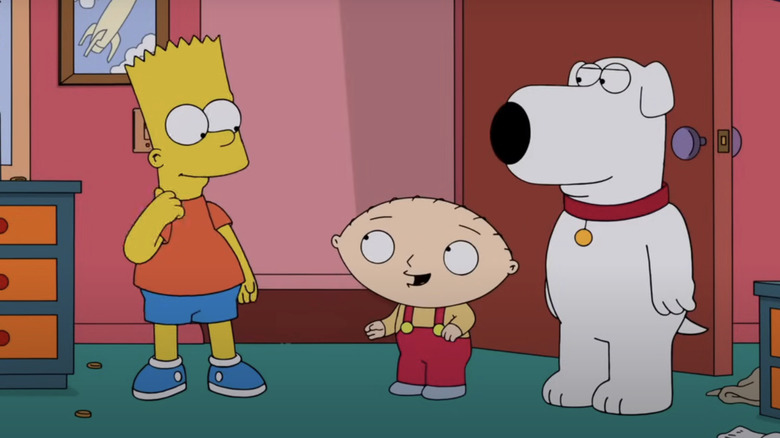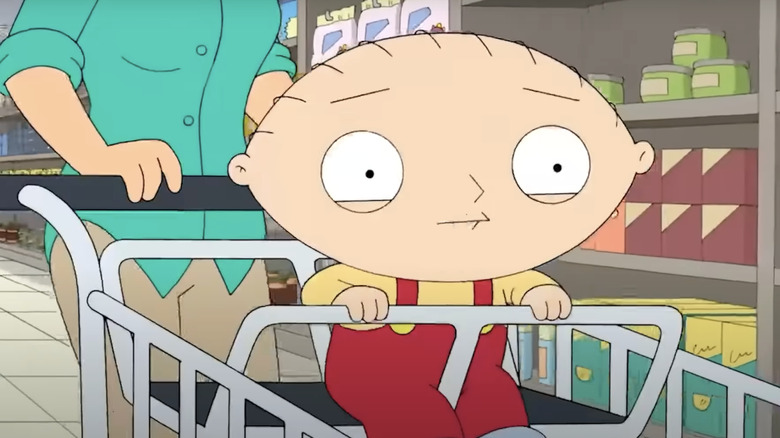The Family Guy Character The Simpsons Creator Wants To Steal
We may receive a commission on purchases made from links.
It's not all that surprising that, in a more than 30-year run, "The Simpsons" has undergone major transformations. When the series debuted in 1989, it stoked the ire of conservative figures who were dismayed by a show that seemed to celebrate dysfunctional families and featured a bratty kid who was proud of his own insubordination. The most obvious example was when President George W. Bush famously stated in a 1992 speech that he wanted American families to be "a lot more like the Waltons and a lot less like the Simpsons."
But by the end of the '90s, the Fox show had lost some of its subversive edge, and not just because it had slowly been subsumed by mainstream culture. In 1999 — ten years after "The Simpsons" debuted, and on the exact same network — "Family Guy" arrived and was immediately more brash, brazen, and willing to go where "The Simpsons" never did in pursuit of a joke. As former showrunner and writer Mike Reiss wrote in his book, "Springfield Confidential," "I'm a jaded, old TV writer, but that show somehow manages to shock me on a weekly basis. They do jokes about AIDS, abortion, and the Holocaust, topics we've never touched."
Alongside the equally shocking and unashamedly vulgar "South Park," which debuted in 1997, "Family Guy" made "The Simpsons" look tame. The former scourge of the American right had become a fairly benign feature of the pop culture landscape, and struggled to match the irreverence of its rivals. Now, 35 years after it first aired, it has become that series that is somehow still running but nobody you know is watching it (though "The Simpsons" can still be good, at times), while "South Park" and "Family Guy" have followed in its footsteps by becoming accepted into pop culture.
Which means, rather than feuding or trying to outdo the other, the creators of these shows are now free to simply chat it up and reminisce about their time on-air, which is exactly what "Simpsons" and "Family Guy" creators, Matt Groening and Seth Macfarlane, did in a 2014 piece for Entertainment Weekly, during which Groening even revealed which character he'd steal from his counterpart's series.
Matt Groening would steal Stewie and make him a Simpson
Though it has received its share of hate over the years, "Family Guy" has some undeniably classic episodes, and it seems Matt Groening likes the show enough to want to steal one of its main characters.
In 2014, "The Simpsons" and "Family Guy" joined forces for a crossover episode, in which Homer Simpson and Peter Griffin are seen continuing a long-running "Family Guy" gag, namely the chicken fight. This staple of the series sees Peter and Ernie the chicken engaging in drawn-out fist fights at random across the series' run. In the Entertainment Weekly interview, Groening was asked which of Seth Macfarlane's characters he'd want to bring over to his show, to which he replied, "Well, I'm really jealous of the chicken — the whole chicken-fight thing. But I guess Stewie. Just comedy gold."
Stewie, the one year old son of Peter and Lois, is one of the best characters on "Family Guy," and it's easy to see why Groening picked him — not that the talking baby with a violent streak would fit into "The Simpsons." Replying to Groening's revelation, Macfarlane talked about how Stewie was inspired by actor Rex Harrison, who starred alongside Audrey Hepburn in "My Fair Lady," but that there is also "a shred of Mr. Burns' influence" in the character. Indeed, the "Family Guy" creator said that he would take Mr. Burns, Homer's boss and the owner of Springfield's nuclear power plant, if he could steal any "Simpsons" character. "He was just always a character that got a nice big laugh out of me when he emerged and throughout his run," Macfarlane added.
The Simpsons doesn't need Stewie
During their EW discussion, Seth Macfarlane remained complimentary of Matt Groening's show throughout, revealing that "[The Simpsons] redirected the course of where [he] wanted [his] professional life to go." Macfarlane recalled:
"I wanted to be a Disney animator, and then 'The Simpsons' came out, and in every way — writing-wise, production-wise, timing-wise, animation-wise — it just rewrote the rulebook."
With that in mind, you get the sense that Groening was just being nice for the sake of the interview by claiming he would take Stewie. The "Simpsons" creator has spoken extensively about the inspirations for his show, and even cites several of those during his EW interview, including the 1959 "Dennis the Menace" series, which he says felt like a letdown as it was much more tame than he'd hoped. In that sense, while Stewie probably appeals to the same part of Groening that wanted Jay North's Dennis to be the real menace the show advertised, it's hard to imagine that he would really take anything from "Family Guy," which remains heavily indebted to its predecessor.
It might not be as fun as watching the two series feud over the airwaves — "The Simpsons" even stopped doing a certain kind of joke because "Family Guy" kept copying it – but this kind of reverence for each other's shows is much more heartening to see than accusations of plagiarism being thrown back and forth. It's also bittersweet, as these kinds of pleasantries and the very fact that "The Simpsons" did a crossover episode with "Family Guy," reminds us that both shows aren't quite what they once were.


